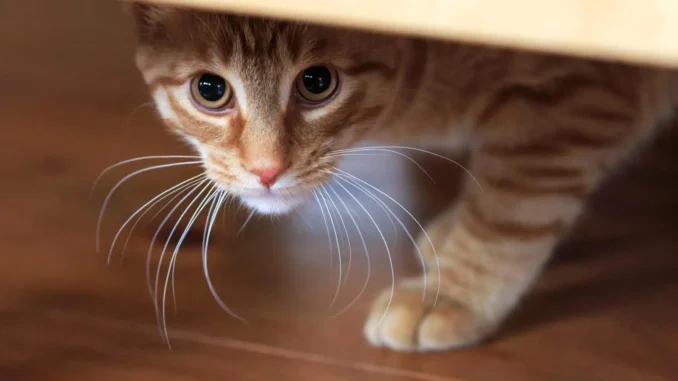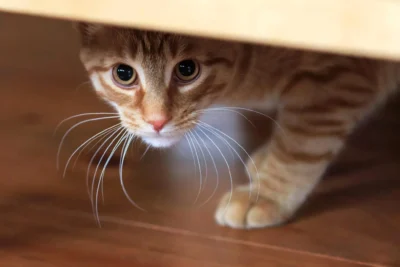
Cats are known for their mysterious behaviors, and one of the most common among them is hiding. If you’ve ever wondered why your cat seeks out secluded spaces or disappears for hours, you’re not alone. Understanding why cats hide and how to make them feel safe can strengthen your bond with your feline friend and ensure their well-being.

Why Do Cats Hide?
1. Instinctual Behavior
Cats are both predators and prey in the wild, meaning they have evolved to seek shelter when they feel vulnerable. Hiding is a natural survival instinct that helps them stay safe from potential threats.
2. Fear and Anxiety
New environments, loud noises, unfamiliar visitors, or even changes in routine can trigger anxiety in cats. When frightened, they may retreat to a quiet, enclosed space to feel secure.
3. Illness or Injury
Cats tend to hide when they’re sick or in pain. This is an instinctual response to avoid drawing attention to their vulnerability. If your cat is hiding more than usual and showing other signs of illness, such as lethargy, loss of appetite, or unusual vocalizations, consult a vet immediately.
4. Need for Rest
Sometimes, cats simply seek solitude to rest. They are known to sleep up to 16 hours a day, and hiding provides them with a peaceful, undisturbed place to nap.
5. Stress or Changes in the Home
Moving to a new house, introducing a new pet, or even rearranging furniture can stress out a cat. In response, they may retreat to a hidden space where they feel in control.
6. Hunting Behavior
Even indoor cats retain their hunting instincts. Hiding allows them to stalk and pounce on toys or imaginary prey, simulating their natural behavior.
How to Make Your Cat Feel Safe
1. Provide Safe Hiding Spots
Instead of trying to stop your cat from hiding, offer them designated hiding places where they can feel secure. Cat trees with enclosed spaces, cardboard boxes, or covered beds work well.
2. Create a Quiet Environment
Loud noises from televisions, appliances, or sudden bursts of sound can stress your cat. Try to keep their environment as calm as possible, especially during noisy activities like vacuuming.
3. Use Pheromone Diffusers
Products like Feliway emit synthetic pheromones that mimic a cat’s natural calming scent. These can help reduce anxiety and encourage a sense of security.
4. Respect Their Space
If your cat is hiding, avoid forcibly removing them. Instead, let them come out on their own terms. Forcing them out can increase stress and damage their trust in you.
5. Establish a Routine
Cats thrive on routine. Feeding them, playing with them, and cleaning their litter box at consistent times can help them feel more secure in their environment.
6. Provide Vertical Spaces
Cats feel safer when they have high vantage points. Consider installing cat shelves, perches, or multi-level cat trees where they can observe their surroundings without feeling threatened.
7. Introduce Changes Gradually
If you’re making changes in your home, such as introducing a new pet or moving furniture, do so gradually. Allow your cat time to adjust and provide them with safe spaces during transitions.
8. Encourage Play and Interaction
Engaging your cat in interactive play with wand toys or laser pointers can help them feel more confident. This can also reduce their need to hide out of fear or boredom.
9. Monitor Health Closely
If your cat is hiding excessively and displaying other concerning behaviors, consult a veterinarian. Sudden changes in hiding behavior may indicate an underlying medical issue.
READ ALSO: Crate Training for Dogs: Dos and Don’ts
FAQs
Is it normal for my cat to hide all the time?
While occasional hiding is normal, excessive or sudden hiding can indicate stress, illness, or fear. If your cat refuses to come out for food, play, or social interaction, it’s best to seek veterinary advice.
How can I get my cat to come out of hiding?
Avoid forcing them out. Instead, use gentle encouragement like treats, their favorite toy, or a soothing voice. Placing their food or a familiar blanket nearby may also help.
Should I be concerned if my new cat is hiding?
Yes, but it’s also normal for a new cat to hide as they adjust to their environment. Give them time and space to explore at their own pace. Provide safe hiding spots and gradually introduce them to the household.
Why does my cat hide under the bed or couch?
These areas are dark, quiet, and enclosed, which makes them ideal for a cat seeking security. Consider providing alternative hiding spots like covered beds or cat caves to make them feel more comfortable.
Can too much hiding be bad for my cat?
Yes. If hiding becomes excessive and interferes with eating, playing, or using the litter box, it may indicate an underlying issue such as illness or severe anxiety. A vet checkup is recommended.
Does hiding mean my cat doesn’t trust me?
Not necessarily. Even well-bonded cats may hide from time to time due to natural instincts. However, if your cat is consistently avoiding interaction, it may indicate fear or discomfort that should be addressed.
How can I make my home more cat-friendly?
Ensure your home has quiet spaces, vertical climbing areas, interactive toys, scratching posts, and a consistent routine. A safe and enriched environment helps reduce the need for excessive hiding.
Conclusion
Hiding is a natural behavior for cats, but understanding the reasons behind it can help you create a safer and more comfortable environment for them. Whether your cat hides due to fear, illness, or simply for rest, respecting their space and providing reassurance will strengthen your bond. By taking small steps to make your home more cat-friendly, you can help your feline friend feel more secure and confident in their surroundings.
Leave a Reply
You must be logged in to post a comment.